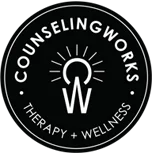Counseling can benefit anyone, regardless of the challenges they face. You might consider counseling if you’re feeling overwhelmed, struggling with relationships, experiencing symptoms of stress, anxiety or depression or simply seeking personal development. If you’re unsure, starting a conversation with a counselor can help determine whether therapy aligns with your needs.
Individuals
Individual Therapy
The Goals of Counseling Works Therapy
There are many reasons to seek out a qualified therapist. Whether you are seeking to explore your feelings, enhance your coping skills, improve your relationships, establish personal goals, or even deal with a traumatic or negative past experience, the ultimate goal of counseling is to better yourself and enrich the quality of your life. The therapists at Counseling Works are ready to assist you with the knowledge and skills needed to improve your life.
Who Should Consider Individual Therapy?
You may think that counseling is just for people who are “broken,” crazy, or who have a specific diagnosis like depression that they want to address. First of all, we don’t think you’re broken or crazy – no matter what. Everyone struggles at different times, and it’s okay to ask for help to work through difficulties. You don’t need a specific diagnosis to come to Counseling Works for therapy sessions. If you want to feel more fulfilled, engage in self-improvement, or experience improved relationships, therapy can be beneficial for you. Some of the reasons you may want to consider counseling include:
- Life transitions – change is inevitable, but that doesn’t mean it’s easy. If you’re struggling with a big life transition, therapy can help you feel more confident and hopeful during your change journey.
- Disordered mood – this can be common in disordered moods like depression and anxiety and other big feelings. We can help you take back power over big emotions that are overwhelming you, making daily life difficult, or negatively impacting your relationships.
- Difficulty managing anger or stress – do you feel really out of control and you can’t figure out why? You may be dealing with poor mood regulation, which may be addressed with counseling for stress and anger management.
- Family turmoil – a healthy, thriving family unit can be a great resource for support and strength in your life. A struggling family can make every other aspect of your life seem a little harder. We can help you improve your familial bonds through better communication, increased empathy, and self-advocacy.
- Difficulty maintaining relationships – do you always seem to be in relationships that are tumultuous, passionate, and end quickly? We can help you understand why this may be happening and seek relationships that are more fulfilling and can stand the test of time.
- Grief and loss – loss of a loved one, end of a relationship, and other losses can leave you struggling with grief over all that lost potential and missing what you had. Your grief and your memories are valuable and should be honored, but you should also give yourself permission to start planning and moving toward your future.
- Eating and nutrition issues – some people have a love/hate relationship with food, struggle to eat healthy and nutrient-rich diets, obsess over their weight or caloric intake, or exercise excessively. We can help you create a healthier relationship with the foods you eat.
How Does Counseling Help?
Visiting us for therapy sessions can help you address the concerns above and a range of other life struggles. Our clinicians utilize a variety of therapy approaches based on your unique needs, but our approach is always guided by mindfulness and understanding the way that early life experiences influence adult beliefs as described below.
Utilize Mindfulness-Based Strategies
- Learn to redirect your thoughts rather than being controlled by them
- Become aware of your reactions and understand what they signify
- Be able to identify when you’re coming from a negative mindset, and how to reconstruct those thoughts
- Build a rational mindset and practice conscious decision-making
- Develop patience towards yourself and others
- Find effective coping strategies to help you process complicated feelings
Learn How Early-Life Experiences Impact Your Current Beliefs
- Identify and overcome self-limiting thought patterns
- Address and replace harmful thinking patterns with compassion
- Become aware of your negative and positive belief systems and learn where they come from
- Overcome roadblocks as you uncover your strengths
FAQs About Individual Counseling in Illinois
What Types of Issues Can Counseling Help With?
Counseling is effective for a range of concerns, from mental health challenges to self-esteem issues. It can also address life transitions, career development and personal growth. At Counseling Works, therapists specialize in various areas to offer tailored support for every individual.
What Are the Different Types of Counseling Available?
We use specialized therapies like Cognitive Behavioral Therapy (CBT), EMDR and mindfulness-based techniques to address your individual concerns. Whether in person or through telehealth, sessions are designed with your specific preferences and goals in mind.
Will What I Share in Counseling Be Kept Confidential?
Yes, confidentiality is a fundamental part of the counseling process. What you discuss with your therapist stays private, with a few exceptions for safety concerns (e.g., if you or someone else is in immediate danger). Your counselor will explain these limits during your first session and answer any questions you have about confidentiality.
Can Counseling Help If I Don't Have a Specific Problem?
Absolutely. Counseling isn’t only for addressing major challenges—it’s also a proactive way to foster self-awareness, build emotional resilience and optimize your well-being. Even if you don’t have a specific issue, counseling can help you gain clarity, set meaningful goals and move toward a more fulfilling life.
Our Therapists Who Work With Individuals

What Our Clients Say

Contact Us
We look forward to connecting with you. Please contact us to schedule your first appointment or to learn more about our services.














































